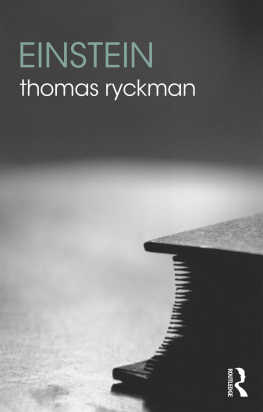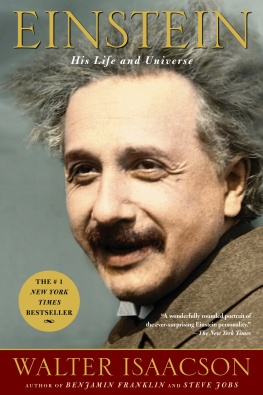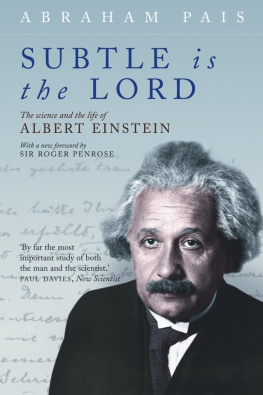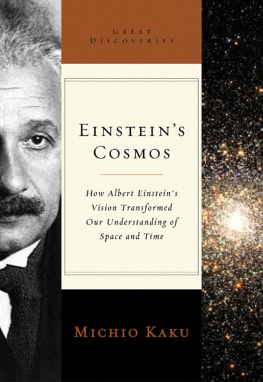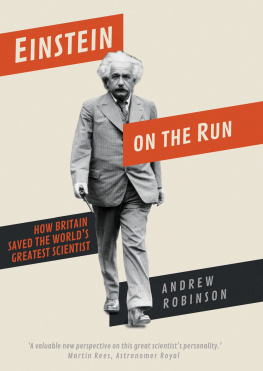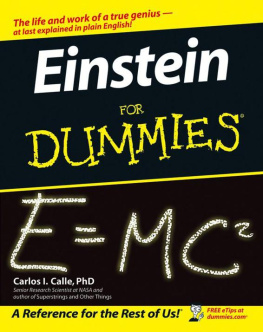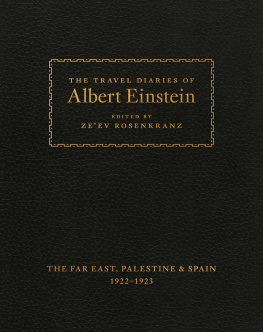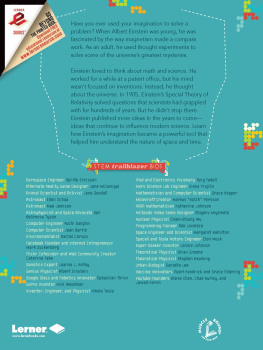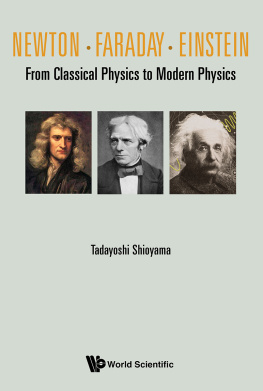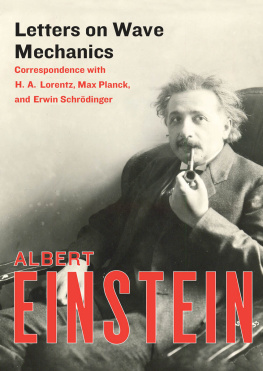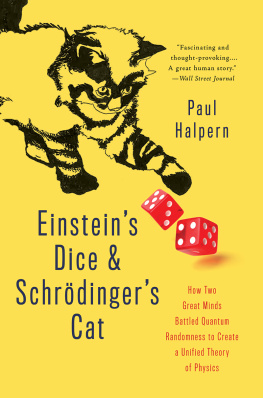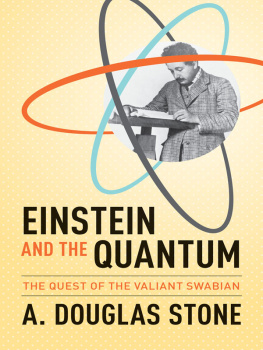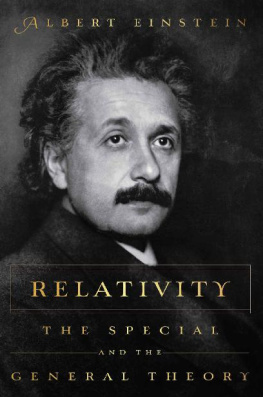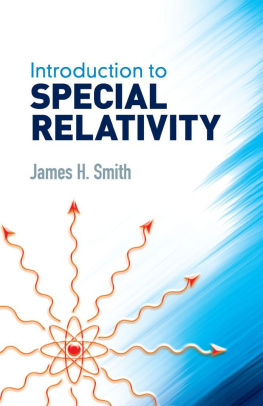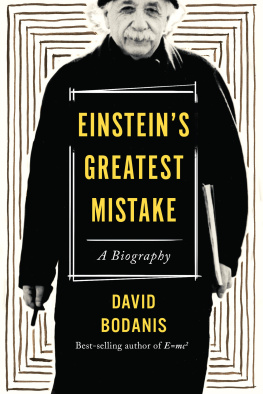Einstein
Albert Einstein (18791955) was the most influential physicist of the 20th century. Less well known is that fundamental philosophical problems, such as concept formation, the role of epistemology in developing and explaining the character of physical theories, and the debate between positivism and realism, played a central role in his thought as a whole.
Thomas Ryckman shows that already at the beginning of his career at a time when the twin pillars of classical physics, Newtonian mechanics and Maxwells electromagnetism, were known to have but limited validity Einstein sought to advance physical theory by positing certain physical principles as secure footholds. That philosophy produced his greatest triumph, the general theory of relativity, and his greatest failure, an unwillingness to accept quantum mechanics. This book shows that Einsteins philosophy grew from a lifelong aspiration for a unified theoretical representation encompassing all physical phenomena. It also considers how Einsteins theories of relativity and criticisms of quantum theory shaped the course of 20th-century philosophy of science.
Including a chronology, glossary, chapter summaries, and suggestions for further reading, Einstein is an ideal introduction to this iconic figure in 20th-century science and philosophy. It is essential reading for students of philosophy of science, and is also suitable for those working in related areas such as physics, history of science, or intellectual history.
Thomas Ryckman is Professor of Philosophy at Stanford University, USA. He is author of The Reign of Relativity: Philosophy in Physics 19151925 (2005).
Routledge Philosophers
Edited by Brian Leiter
University of Chicago
Routledge Philosophers is a major series of introductions to the great Western philosophers. Each book places a major philosopher or thinker in historical context, explains and assesses their key arguments, and considers their legacy. Additional features include a chronology of major dates and events, chapter summaries, annotated suggestions for further reading, and a glossary of technical terms.
An ideal starting point for those new to philosophy, they are also essential reading for those interested in the subject at any level.
Recently published:
Kant, second edition
Paul Guyer
Hume
Don Garrett
Dewey
Steven Fesmire
Freud, second edition
Jonathan Lear
Habermas
Kenneth Baynes
Peirce
Albert Atkin
Plato
Constance Meinwald
Plotinus
Eyjlfur Emilsson
Forthcoming:
Merleau-Ponty, second edition
Taylor Carman
Levinas
Michael Morgan
Cassirer
Samantha Matherne
Kierkegaard
Paul Muench
Anscombe
Candace Vogler
Mill
Daniel Jacobson
Berkeley
Lisa Downing and David Hilbert
Nietzsche
Maudemarie Clark
Du Bois
Chike Jeffers
Marx
Jaime Edwards and Brian Leiter
Sartre
Kenneth Williford
Bergson
Mark Sinclair
Arendt
Dana Villa
Adam Smith
Samuel Fleischacker
Thomas Ryckman
Einstein

First published 2017
by Routledge
2 Park Square, Milton Park, Abingdon, Oxon OX14 4RN
and by Routledge
711 Third Avenue, New York, NY 10017
Routledge is an imprint of the Taylor & Francis Group, an informa business
2017 Thomas Ryckman
The right of Thomas Ryckman to be identified as author of this work has been asserted by him in accordance with sections 77 and 78 of the Copyright, Designs and Patents Act 1988.
All rights reserved. No part of this book may be reprinted or reproduced or utilised in any form or by any electronic, mechanical, or other means, now known or hereafter invented, including photocopying and recording, or in any information storage or retrieval system, without permission in writing from the publishers.
Trademark notice: Product or corporate names may be trademarks or registered trademarks, and are used only for identification and explanation without intent to infringe.
British Library Cataloguing-in-Publication Data
A catalogue record for this book is available from the British Library
Library of Congress Cataloging-in-Publication Data
Names: Ryckman, Thomas, author.
Title: Einstein / by Thomas Ryckman.
Description: 1 [edition]. | New York : Routledge, 2017. |
Series: Routledge philosophers | Includes bibliographical
references and index.
Identifiers: LCCN 2016056482 | ISBN 9780415773263 (hardback:
alk. paper) | ISBN 9780415773270 (pbk.: alk. paper) |
ISBN 9781315175829 (e-book)
Subjects: LCSH: Einstein, Albert, 18791955. | PhysicistsBiography. |
Relativity (Physics) | Special relativity (Physics) | Quantum theory.
Classification: LCC QC16.E5 R93 2017 | DDC 530.092 [B]dc23
LC record available at https://lccn.loc.gov/2016056482
ISBN: 978-0-415-77326-3 (hbk)
ISBN: 978-0-415-77327-0 (pbk)
ISBN: 978-1-315-17582-9 (ebk)
Typeset in Joanna MT and Din
by Apex CoVantage, LLC
for Arthur
Contents
One
Life and works
Part I
Quantum theory
Two
On the road to Planck 1900
Three
Contributions to the old quantum theory
Four
Quantum mechanics
Part II
Relativity
Five
Special relativity
Six
General relativity
Part III
Geometry and philosophy
Seven
Geometry and experience
Eight
Philosophy of science realism
Nine
Philosophy of science constructivism
Ten
Philosophy of science rationalism
Eleven
Influence and legacy
Guide
I am grateful to the community of excellent Einstein scholars, from whom I have learned just how difficult it is to write sensibly and informatively about someone literally larger than life. Among them, I recognize in particular Olivier Darrigol, Joroen van Dongen, Peter Galison, Herbert Goenner, Hanoch Gutfreund, Gerald Holton, Don Howard, Michel Janssen, Daniel Kennefick, Diana Kormos-Buchwald, Anne J. Kox, Dennis Lehmkuhl, Arthur I. Miller, John Norton, Hans C. Ohanian, Jurgen Renn, Tilman Sauer, and John Stachel. I am grateful to my colleagues, past and present, in the Department of Philosophy at Stanford for their continuous encouragement, and to Michael Friedman, Helen Longino, and Paolo Mancosu for intellectual sustenance. Heartfelt thanks to Olivier Darrigol and Arthur Fine for extremely helpful criticism and comments on drafts of various chapters. I benefitted from comments of Patrick Austin, Harald Wiltsche and Rasmus Winther while Marlene Griffiths Bagdikian assisted in turning much of a teutonically ponderous written text into passable English prose. Above all, I owe the inspiration, or audacity, to undertake this project, almost a common labor of love, to Arthur Fine: mentor, colleague, and friend.
| 1879 | Born March 14 in Ulm, Germany, first child of Hermann and Pauline (ne Koch), bourgeois, largely non-observant, Jews. |
| 1880 | Family moves to Munich where Hermann and brother Jakob form electrical engineering firm Electrotechnische Fabrik J. Einstein & Cie. |
| 1881 | Sister Maria (Maja) born on November 18; lifelong confidant, she joins Albert in Princeton in 1939. |

